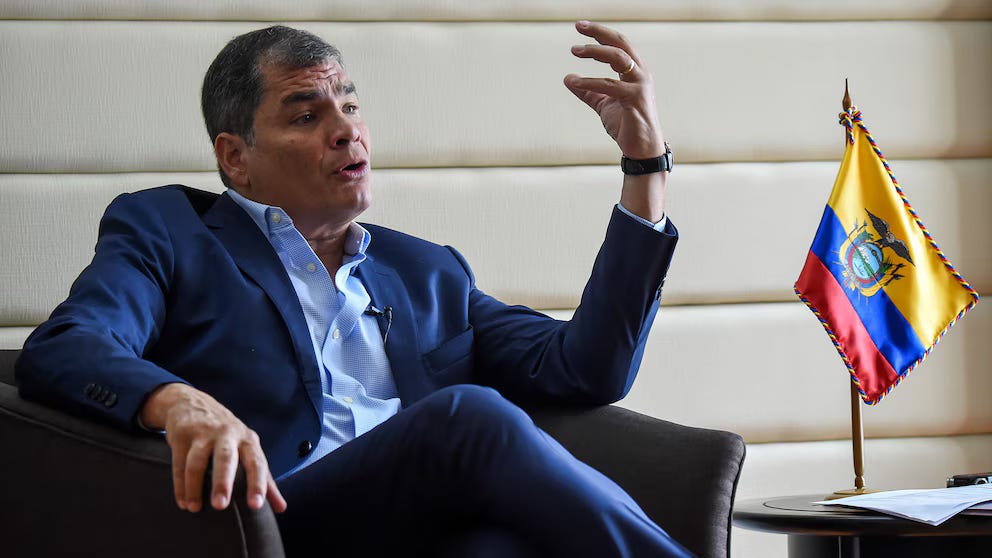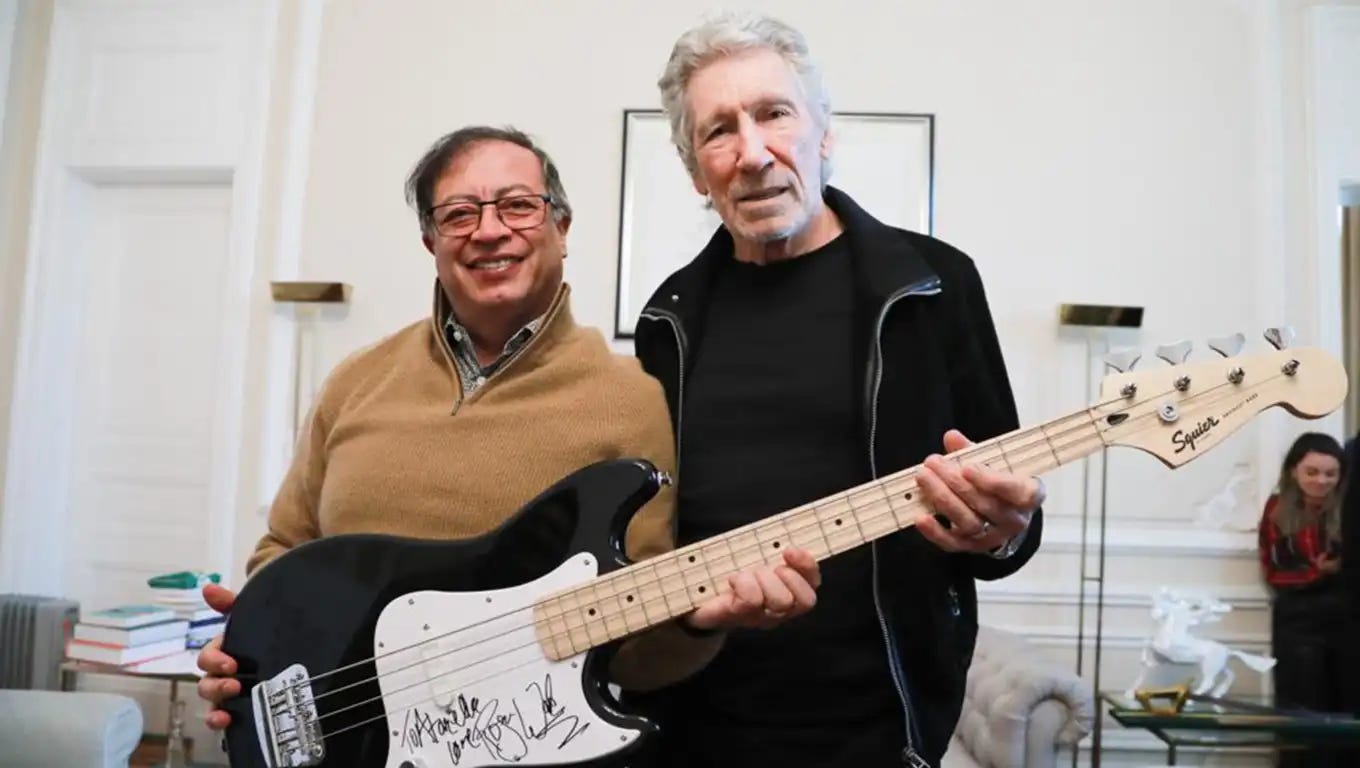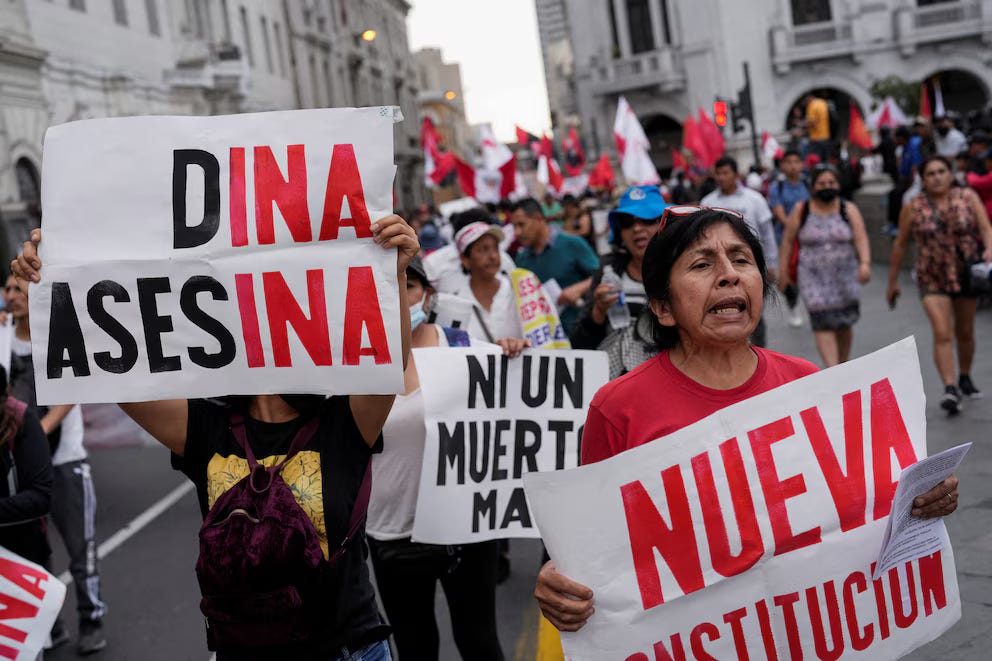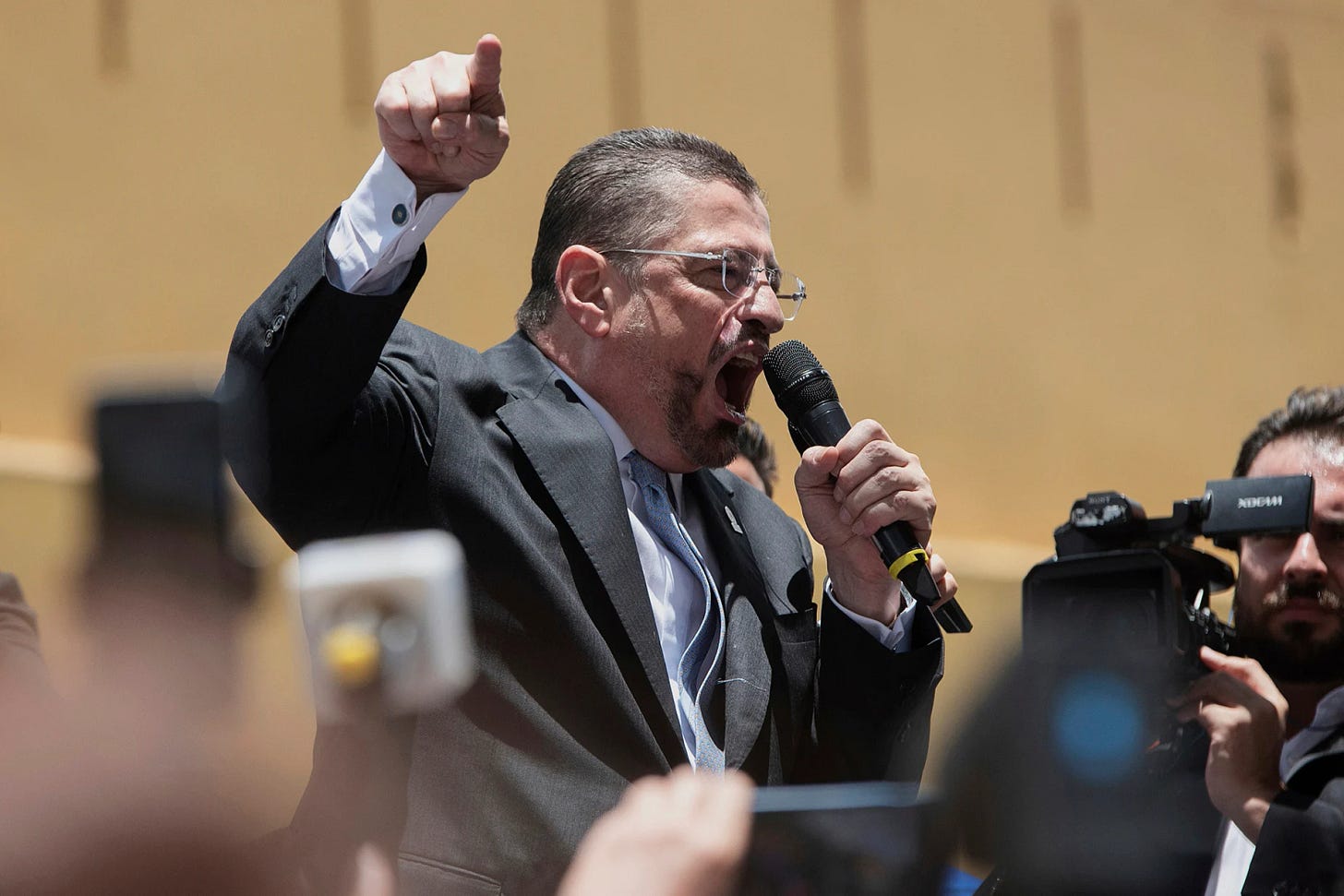How I Wish, How I Wish You Weren't Here...
Therefore, I will revoke your visa.
Colombian President Gustavo Petro made international news this week when the United States revoked his visa. This came after his trip to New York for the UN General Assembly, where he joined a pro-Palestinian rally and urged U.S. soldiers not to follow President Donald Trump’s orders in Gaza. He argued that people should prioritize humanity over politics. The U.S. government described his remarks as reckless.
Petro dismissed the ban, joking that it did not affect him because he also holds European citizenship. He claimed he was being punished for speaking out against genocide.
He does have a point here, though it’s worth noting he was seen with Roger Waters, whose views on Latin America are often disappointing. For those of you abroad, especially progressives in the U.S. and Europe, don’t assume Petro’s actions show he’s standing up to American power. Many Colombians saw this as another embarrassing episode from a president who seems more interested in making headlines overseas than in governing at home.
I would define Petro as a “late graduate” of Latin America’s Pink Tide, which was a group of left-wing presidents in the 2000s known, among other things, for standing up to the U.S. Think of Venezuela’s Chávez calling George W. Bush the devil at the UN, or Ecuador’s Correa and Argentina’s Kirchner loudly criticizing the IMF. Petro tries to follow in their footsteps, but while Chávez’s actions once excited people, Petro’s tweets and unscripted comments seem more like silly antics that push people away as much as they attract them.
This is not the first time Petro’s words have created tension with other countries. He has accused the U.S. of plotting to overthrow him and halted deportation flights as a way to retaliate against Washington. At the UN this year, he also called for a criminal investigation into Trump over U.S. military actions in the Caribbean.
Again, he is mostly speaking to the global left, where these statements are well received. But in Colombia, Petro’s approval ratings remain low, affected by economic troubles and the sense that he is more interested in international debates than in addressing local issues. Many Colombians who once hoped for change now see a president distracted by online arguments and appearances abroad.
Losing his visa is more than a symbolic punishment. Colombia has played a key role in U.S. security efforts in Latin America, so this decision highlights how much the relationship has deteriorated since Trump returned to office. For Petro, it is another sign of his readiness to challenge the U.S.
There is an irony here. The more Petro criticizes other countries, the weaker he seems at home. He wants to be remembered as a Latin American leader who stood up to Washington, but with less than a year left in his term, he now looks like a president who makes bold statements but is unlikely to fulfill his promises.
Boluarte, the President Nobody Wants
This week, protests happened in Lima over a controversial pension reform, which draws our attention to Peru’s unusual political situation. Dina Boluarte is one of the region’s least popular leaders, yet she is still in office. Her approval rating is only 2.5%, and Congress is above her... at 3%.
Many Peruvians blame both for corruption, repression, and inaction.
Latin America has two kinds of unpopular presidents: the strongmen you can’t get rid of, like Venezuela’s Maduro, Nicaragua’s Ortega, Cuba’s Díaz-Canel, and maybe soon El Salvador’s Bukele, and the unusual ones who stay in power even though nobody wants them. Boluarte is in the second group. Peru is known for getting rid of its presidents quickly, but she has stayed longer than people thought because Congress cares more about itself than about calling early elections.
People in Peru are frustrated. The country wants change, but its leaders have lost the public’s trust.
For Boluarte, it now appears that her main aim is simply to hold on to power.
Really? In Costa Rica?
I used to see Costa Rica as one of the few Latin American countries that really had things together. Like Uruguay, it was often held up as proof that democracy could thrive in the region, with stable institutions, little corruption, no military, and a calm political scene.
But after talking with a journalist friend from Cartago a few weeks ago, I realized things are different now. There’s more insecurity, new corruption scandals, and even a president facing charges. That old image has been shaken.
Rodrigo Chaves became president in 2022 after promising big changes. He’s led as an outsider, often clashing with the press, criticizing government agencies, and claiming to represent ordinary people. This week, he faced a major challenge when the Supreme Court asked Congress to remove his legal immunity so he could be charged for urging a contractor to send money to a former campaign worker. Thirty-four lawmakers voted in favor, but they needed 38, so the effort fell short.
Chaves responded as if he had been cleared, calling the situation a “political show.” Still, the accusations remain, and prosecutors can revisit the case after he leaves office in 2026.
What stands out is that even in Costa Rica, a country many saw as an exception, the president came close to facing court. It’s a reminder that no democracy in the region is entirely free from trouble.
Wake Up Babe, It’s Time for Your Constituent Assembly

Last week, we talked about the protests in Ecuador after the president decided to end subsidies. Things are changing fast.
Daniel Noboa, who is 37, wants to show he is a reformer by calling for a public vote on November 16. This vote would decide if an Assembly should be created to rewrite the constitution. He says the 2008 Constitution, made when Rafael Correa was president, is too strict and makes it hard for the government to deal with growing gang violence.
According to him, new rules are needed to improve safety and governance in Ecuador.
Some critics think there could be other motives behind this plan. They are concerned that a Constituent Assembly might change presidential term limits or give the president more power. Even though Noboa says he does not support unlimited re-election, many people are still unsure.
If voters agree to the plan, Ecuador will spend 2026 choosing representatives, drafting a new constitution, and then voting on it again. This would be the third constitution in less than thirty years, which shows how often changing the rules can make it hard for people to feel stable.
Before Oasis, There Was Soda Stereo
Every now and then, a rock band returns and reminds us why we love music. Britpop fans experienced this with Oasis earlier this year. In Latin America, Soda Stereo did it first, back in 2007, and it was huge.
This week, the legendary Argentine trio has fans excited again. A true comeback can’t happen because Soda’s frontman, Gustavo Cerati, passed away in 2014, but something is in the works.
Their official site is showing a “glitched” static-filled screen, Buenos Aires is covered with posters reading their names (Gustavo, Charly, Zeta), and subway stations flashed iconic Soda lyrics on billboards.
Some people think it could be a tribute concert, while others hope for new music. The surviving members recently shared that they found a lost track.
For anyone who asks me, Soda Stereo is the gateway to rock en español. Cerati’s influence shaped several generations, and his band remains the benchmark for Latin rock. My personal favorite album is Signos, though the experimental Dynamo and the massive Canción Animal show just how versatile they were.
If you haven’t listened to them yet, now is a great time to start.
That’s all for this week. If you liked what you read, please subscribe.
You’ll get something like this every Sunday: one main analytical piece, three important stories from Latin America, and one media suggestion to help you learn more about our region.
You can also follow me on Instagram, X, and TikTok for more.
Gracias por leer. Hasta la semana que viene.






